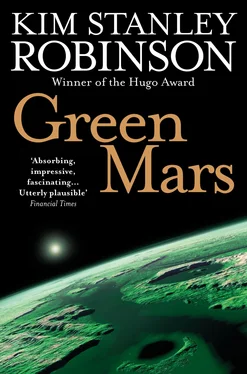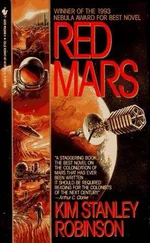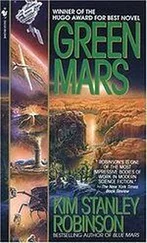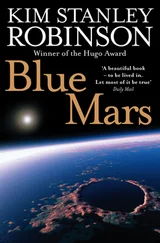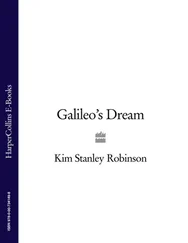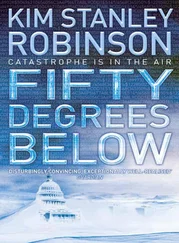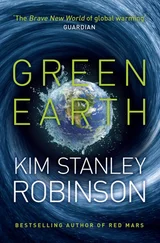1 ...7 8 9 11 12 13 ...37 “Have you told her that?”
“You bet I have, but Hiroko only listens to me when I say things she wants to hear.” He cackled. “Same as with everyone, right?”
Nirgal nodded, a grin splitting his attempt to be impassive.
“You want to find out who your father is?”
“Sure.” Actually he was not sure. The concept of father meant little to him; and he was afraid it would turn out to be Simon. Peter was like an elder brother to him, after all.
“They’ve got the equipment in Vishniac. We can try there if you want.” He shook his head. “Hiroko is so strange. When I met her you would never have guessed it would come to this. Of course we were young then—almost as young as you are, though you will find that hard to credit.”
Which was true.
“When I met her she was just a young eco-engineering student, smart as a whip and sexy as a cat. None of this mother goddess of the world stuff. But by and by she started to read books that were not her technical manuals, and it went on and on and by the time she got to Mars she was crazy. Before, actually. Which is lucky for me as that is why I’m here. But Hiroko, oh my. She was convinced that all human history had gone wrong at the start. At the dawn of civilisation, she would say to me very seriously, there was Crete and Sumeria, and Crete had a peaceful trading culture, run by women and filled with art and beauty—a Utopia in fact, where the men were acrobats who jumped bulls all day, and women all night, and got the women pregnant and worshipped them, and everyone was happy. It sounds good except for the bulls. While Sumeria on the other hand was ruled by men, who invented war and conquered everything in sight and started all the slave empires that have come since. And no one knew, Hiroko said, what might have happened if these two civilisations had had a chance to contest the rule of the world, because a volcano blew Crete to kingdom come, and the world passed into Sumeria’s hands and has never left it to this day. If only that volcano had been in Sumeria, she used to tell me, everything would be different. And maybe it’s true. Because history could hardly get any blacker than it has been.”
Nirgal was surprised at this characterisation. “But now,” he ventured, “we’re starting again.”
“That’s right, boy! We are the primitives of an unknown civilisation. Living in our own little techno-Minoan matriarchy. Ha! I like it fine, myself. Seems to me the power that our women have taken on was never that interesting to begin with. Power is one half of the yoke, don’t you remember that from the stuff I made you kids read? Master and slave wear the yoke together. Anarchy is the only true freedom. So, well, whatever women do, it seems to go against them. If they’re men’s cows, then they work till they drop. But if they’re our queens and goddesses then they only work the harder, because they still have to do the cow work and then the paperwork too! No way. Just be thankful you’re a man, and as free as the sky.”
It was a peculiar way to think of things, Nirgal thought. But clearly it was one way to deal with the fact of Jackie’s beauty, of her immense power over his mind. And so Nirgal ducked low in his seat and stared out the window at the white stars in the black, thinking, Free as the sky! Free as the sky!
It was Ls 4, 2 March 22nd, M-year 32, and the southern days were getting shorter. Coyote drove their car hard every night, over intricate and invisible paths, through terrain that got more and more rugged the farther they got from the polar cap. They stopped to rest during the daylight, and drove the rest of the time. Nirgal tried to stay awake, but inevitably slept through part of every drive, and through part of every day’s stop as well, until he became thoroughly confused in both time and space.
But when he was awake he was almost always looking out the window, at the ever-changing surface of Mars. He couldn’t get enough of it. In the layered terrain there was an infinite array of patterns, the stratified stacks of sand fluted by the wind until each winglike dune was cut like a bird’s wing. When the layered terrain finally ran out onto exposed bedrock, the laminate dunes became individual sand islands, scattered over a jumbled plain of outcroppings and clusters of rock. It was red rock everywhere he looked, rock sized from gravel to immense boulders that sat like buildings on the land. The sand islands were tucked into every dip and hollow in this rockscape, and they also clustered around the feet of big knots of boulders, and on the lee sides of low scarps, and in the interiors of craters.
And there were craters everywhere. They first appeared as two bumps rolling over the skysill, which quickly proved to be the connected outer points of a low ridge. They passed scores of these flat-topped hills, some steep and sharp, others low and nearly buried, still others with their rims broken by smaller later impacts, so that one could see right in to the sand drifts filling them.
One night just before dawn Coyote stopped the car.
“Something wrong?”
“No. We’ve reached Ray’s Lookout, and I want you to see it. Sun’ll be up in a half hour.”
So they sat in the pilots’ seats and watched the dawn.
“How old are you, boy?”
“Seven.”
“What’s that, thirteen Earth years? Fourteen?”
“I guess.”
“Wow. You’re already taller than me.”
“Uh huh.” Nirgal refrained from pointing out that this did not imply any great height. “How old are you?”
“One hundred and nine. Ah ha ha! You best shut your eyes or they’ll pop out of your head. Don’t you look at me like that. I was old the day I was born and I’ll be young the day I die.”
They drowsed as the sky on the eastern skyline turned a deep purply blue. Coyote hummed a little tune to himself, sounding as if he had eaten a tab of omegendorph, as he often did in the evenings at Zygote. Gradually it became clear that the skysill was very far away, and also very high; Nirgal had never seen land so far away, and it seemed to curve around them as well, a black curving wall that lay an immense distance off, over a black rocky plain. “Hey Coyote!” he exclaimed. “What is this?”
“Ha!” Coyote said, sounding deeply satisfied.
The sky lightened and the sun suddenly cracked the upper edge of the distant wall, blasting Nirgal’s vision for a while. But as the sun rose, the shadows on the huge semi-circular cliff gave way in wedges of light that revealed sharp ragged embayments, scalloping the larger curve of the wall, which was so big that Nirgal simply gasped, his nose pressed right against the windshield—it was almost frightening it was so big! “Coyote, what is it?”
Coyote let out one of his alarming laughs, the animal cackle filling the car. “So you see it isn’t such a small world after all, eh, boy? This is the floor of Promethei Basin. It’s an impact basin, one of the biggest on Mars, almost as big as Argyre, but it hit down here near the South Pole, so about half of its rim has since been buried under the polar cap and the layered terrain. The other half is this curved escarpment here.” He waved a hand expansively. “Kind of like a super-big caldera, but only half there, so you can drive right into it. This little rise is the best place I know for seeing it.” He called up a map of the region, and pointed. “We’re on the apron of this little crater here, Vt, and looking northwest. The cliff is Promethei Rupes, there. It’s about a kilometre high. Of course the Echus cliff is three kilometres high, and the Olympus Mons cliff is six kilometres high, do you hear that Mister Small Planet? But this baby will have to do for this morning.”
The sun rose higher, illuminating the great curve of the cliff from above. It was deeply cut by ravines and smaller craters. “Prometheus Sanctuary is in the side of that big indentation there,” Coyote said, and pointed to the left side of the curve. “Crater Wj.”
Читать дальше
